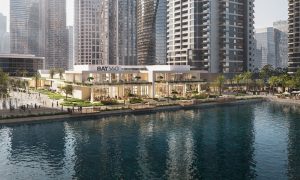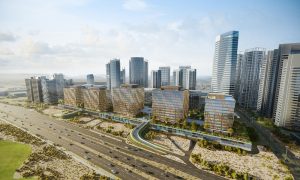Analysis: Dubai market review and forecast
Dubai’s approach to Covid crisis has set up a positive outlook for real estate in 2022, writes Robert Thomas – Head of Agency at CORE

The UAE government continues to make strides with pioneering policies and reforms, cementing its position as a global hub for business, investment and talent with a raft of highly favourable visa regulations aimed at attracting and retaining residents across all demographics. The latest reform to align with the global workweek and being the first country in the world to officially commence on a 4.5-day work is expected to have a cascading positive effect on Dubai’s business competitiveness.
Dubai continues to manage the pandemic efficiently with the highest vaccination rates and robust protocols – keeping safety and business continuity at the forefront. This has made the UAE rise to the top of most global indices, with the latest addition being ranked as the most popular destination in the 2022 TripAdvisor Travellers’ Choice Awards. The launch and ongoing success of Expo 2020 along with a very busy winter season with one of the highest hotel occupancies recorded in Q4 2021 is a further testament to Dubai’s global appeal.
With many demand drivers including forward-thinking and strategic government initiatives, the lowering of LTVs along with business resilience during the pandemic, have helped Dubai in reviving strong investment interest across sectors. This has created upward pressure on the real estate market with a 10% rise in city-wide capital values and a 7% rise in rentals witnessed over 2021, while prime residential districts considerably outperformed.
Looking forward, with a robust budget of AED181 billion announced for 2022-24 focusing on infrastructure, social development, security, safety and innovation, economic sentiment is the most optimistic it has been in the last seven to eight years. We expect 2022 to see a continued uptick in values, albeit at a slower pace compared to the last few quarters and forecast steady activity levels with demand coming in from new entrants, investors and existing occupiers leading to a flight to quality in established office and residential districts.
We detail our residential market forecasts further below:
- We expect sales transactions, in the secondary and particularly off-plan market, to see a steady uptick in 2022 as demand continues from local and international buyers. Investor interest increased sharply over 2021 due to relative ease in travel restrictions, positive sentiment, and a rise in the number of tourists stemming from Expo 2020 coupled with Dubai’s demonstrated success in managing the pandemic efficiently. That said, the Dubai residential market continues to be led by end-users driven by the raft of social and economic reforms along with the lowering of interest rates and LTV ratios.
- Sales prices to witness a gradual, yet, continued rise, particularly in prime villa and apartment districts, with most districts expected to near 2014 peak values.
- Rental market to balance out and start favouring the landlords after being tenant-friendly for years, however, rental rises will not be uniform across the city. COVID-19 variants will continue to impact remote working, thus keeping demand for villas and larger units strong. Prime districts to continue outperforming the market, further intensifying market fragmentation. While we expect most districts to recover, prime districts due to limited availability and high demand, are expected to see sharper rises.
- With a high number of handovers expected in 2022, oversupply will remain a downside risk, particularly in the sub-urban apartment districts due to most of the supply concentrated in these areas.
While COVID-19 variants cause continued uncertainty, we expect market sentiment to remain positive over 2022 due to the UAE government’s focus on making the country the preferred place for businesses and residents while safely managing the pandemic and maintaining business continuity. These reforms are expected to positively impact the real estate market and bolster demand across asset classes. However, market recovery is expected to be segmented with a few residential districts witnessing slower stabilisation rates due to the supply overhang, and the Grade B and C office stock which has historically struggled in absorption, continuing to face challenges.

























